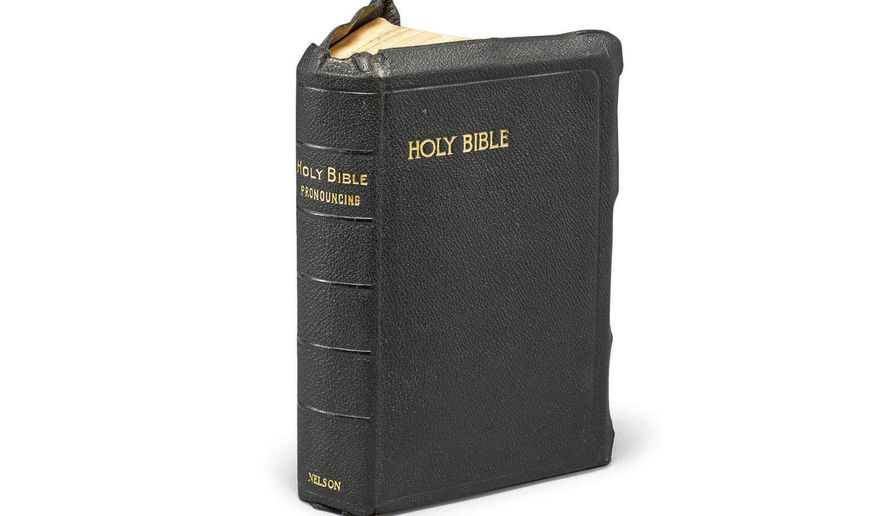Legislatures from the Bible Belt to the Dakotas are mulling bills that would establish biblical literacy courses in high schools, but some education analysts say classes focusing on the Bible’s cultural and historical relevance already are offered in public schools in those states and elsewhere.
An education official in Indiana said students in the state have been able to study Bible-based literature for some time. Nearly a third of high schools in Iowa offered religious education courses last year, an official there said.
When Kentucky lawmakers overwhelmingly passed state Rep. DJ Johnson’s bill to standardize rules for social studies classes in 2017, some school districts had long been teaching Bible literacy in their high schools.
“I don’t think it’s the lightning rod that everyone says it is,” said Mr. Johnson, a Republican from Owensboro who lost a tight race for his seat in November. “This wasn’t a big deal in the ’60s. I had a grade school teacher who read to our class out of a children’s Bible book, and that time of her reading to me was what motivated me to become the reader that I am.”
President Trump expressed his support for biblical education last week by tweeting: “Numerous states introducing Bible Literacy classes, giving students the option of studying the Bible. Starting to make a turn back? Great!”
Last year, Kentucky made news by taking the unusual step of promulgating standards for courses on the Old and New Testaments, which are offered as high school electives in the state.
Roughly a quarter of county schools taught religious studies last year, and these classes have long focused on “analysis of literary, cultural or historical influences of these texts,” said Jessica Fletcher, a spokeswoman for the Kentucky Department of Education.
Not all states where legislation has been proposed are enacting Bible literacy courses.
The North Dakota Senate last month rejected a biblical education bill that was inspired by Kentucky’s program.
“To be honest, we weren’t really surprised,” state Rep. Aaron McWilliams, a Republican who sponsored the bill, said in a telephone interview. “There was a lot of misinformation about it from people saying, ’Oh my gosh — you want to offer New Testament and Old Testament.’”
He said the legislation wouldn’t have mandated teaching and would have allowed teachers of history or literature to use a text that governs intellectual thought in Western civilization.
“I believe in the separation of church and state, just not in the separation of a book from a classroom,” Mr. McWilliams said.
North Dakota state Sen. Erin Oban, a Democrat, disagreed. She said the bill “wasn’t written [the way] bill sponsors and co-sponsors are claiming.” She pointed out that state law allows parents to remove students from school up to an hour a week for private religious education.
Religious education in public schools is generally prohibited under the U.S. Constitution’s establishment clause, which bans state-sanctioned religion.
Ken McKenzie, CEO of the Museum of the Bible in the District of Columbia, said it is possible to teach from the Bible in a nonsectarian way. His organization provides curricula to home-schoolers, private Christian schools across the U.S. and schools in Israel, where Bible study is part of high school education.
He offered as an example the Old Testament story of David and Goliath.
“We’ll read the story, and then we’ll study the material around it. Archaeological excavations have found the stone that was used of 1.5 to 2 pounds, and we’ll review some ancient texts about life at that time and watch a video that shows how a sling could be accurate,” Mr. McKenzie said. “This is not [an assignment that says], ’This is what we believe.’”
Meanwhile, Indiana’s biblical literature class is sandwiched between American and contemporary literature classes in the 2018-2019 public schools catalog and asks students to study a “wide variety of literary patterns, themes and conventions.” The class even encourages the use of apocryphal and heretical texts, and prompts discussion about the “problems with interpretation.”
A bill before the Iowa Legislature to allow for Bible curriculum says “religious neutrality” is required, but critics say such legislation is ripe for abuse.
“Public schools can teach about how religious texts have influenced our culture, but they cannot preach religion,” said Rachel Laser, president & CEO of Americans United for Separation of Church and State, noting that such distinction was one that “most Bible classes find difficult to make.”
The Kentucky chapter of the American Civil Liberties Union last year released results of its investigation of all 173 school districts in the state, saying the biblical curriculum often ignored constitutional constraints against teaching religion.
“While most districts are not offering these courses, the ACLU-KY found many of the courses that are being offered do not fall within constitutional strictures, which require any use of religious text in the classroom to be secular, objective, nondevotional, and must not promote any specific religious view,” the ACLU said in a letter to Kentucky schools.
Among its findings, the ACLU cited Barren County schools for assigning students to write letters to family members encouraging visits to a regional museum because of a “religious exhibit relating to faith and religious heritage.” The civil rights group also cited Letcher County, where students are asked to answer, “What are some promises in the Bible that God gives everyone who believes in him?”
No officials at either school district responded to requests for comment.
• Christopher Vondracek can be reached at cvondracek@washingtontimes.com.




Please read our comment policy before commenting.